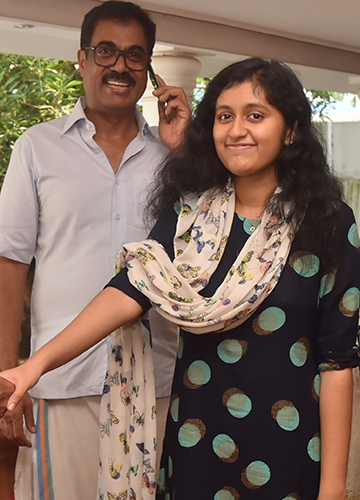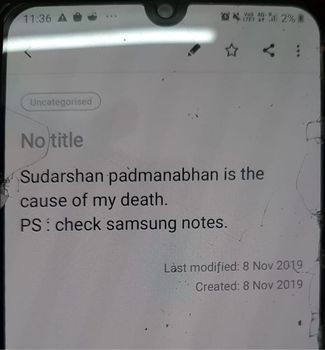THERE IS A SANCTITY about the IIT that is missing in most other centres of learning. But now this idyllic situation is being threatened,” said P.V. Indiresan, then director of the Indian Institute of Technology Madras, attacking the reservation policy during the 20th convocation in 1983. Giving special treatment to students from the scheduled castes and tribes, he said, was lowering the academic standards of institutions like IIT Madras. Made in the presence of president Giani Zail Singh, Indiresan’s comment was welcomed by most of his staff members.
That line of thought continues to lurk in the shadows of the IIT Madras campus. It came to the fore with the death of Fathima Latheef, a first year postgraduate student of humanities and development studies. Hailing from Kollam in Kerala, the 19-year-old was found hanging in her hostel room on November 9. Initially, it seemed that she had killed herself over academic pressure. But a few days later, her father, Abdul, said, “For my daughter, her name itself was the problem.” A bright student, Fathima, he said, was harassed by her professors, whose names she had allegedly mentioned in the notes on her phone. In one note, she allegedly wrote that Sudarshan Padmanabhan was “the cause of my death”.
Students said that the faculty at IIT Madras largely acts as advocates of meritocracy, ignoring the rigorous training and trauma students go through while preparing for IIT. Most teachers, they say, also forget the socioeconomic background the students come from. “The teachers are very much a part of the larger system in India that is casteist, patriarchal, Brahminical and feudal. They bring along with them their own prejudices, which could turn into explicit or implicit discrimination against students,” read a recent post by Ambedkar Periyar Study Circle (APSC), a recognised student body at IIT Madras.
The post mentioned that “Fathima’s suicide was discussed alongside other six suicides that happened at IIT Madras since September 2018”. Students, the post read, feel helpless when they are treated in an unfair, undemocratic manner, and this eventually takes a toll on their mental health. Formed in 2014, the APSC was de-recognised in 2015 following an anonymous complaint to the Union human resources and development ministry that the group was creating animosity against Prime Minister Narendra Modi. It was soon re-recognised after widespread outrage. Prof Milind Brahme, who also has been allegedly named by Fathima in her note, is its faculty adviser.
In the last two years, 2,461 students dropped out of the 23 IITs in the country, as per data provided by the HRD ministry. Of these, 128 were from IIT Madras. “IIT Madras is blind when it comes to addressing the mental agony of the student,” said Arjun Jayakumar, an APSC member. Among the dropouts though, 371 were from the scheduled caste, 199 from the scheduled tribes and 601 from other backward classes. According to information obtained under the Right to Information Act by Dr E. Muralidharan, a former member of the board of academic research of IIT Madras, only 12.4 per cent of the 684 faculty members belong to the reserved categories; the rest are largely from the upper caste. Also, all seats in the open category, which constitutes 50 per cent of the seats, were taken by students from the forward castes. For instance, in 2018, 255 of the 498 BTech seats went to forward caste students. There were 256 seats in the open category, and only one went to a backward class student. No scheduled caste or scheduled tribe student was admitted in the open category. “IIT Madras does not give representation to students from other castes. Favouritism and social discrimination prevail at a higher level inside the campus. It is dominated by the forward castes,” Muralidharan told THE WEEK.
The discrimination is starker among research students. “IIT Madras is the most stinking campus in terms of caste discrimination,” said W.B. Vasantha Kandasamy, who retired as professor of mathematics from IIT Madras. “Every other university helps its students for research and publishing thesis. But here, everything is under lock and key, and for getting access to it we will have to go through a long procedure and be supervised by at least 10 people when we do the reference.” She had gone to court in 1997, citing discrimination when she was denied the professor’s post at IIT Madras. “There was a dalit student who came to do research during my tenure. He was not given a room in the hostel, saying [he was an] untouchable,” she recalled. “I helped him stay with another professor.”
Last year, the IIT Madras campus saw protests over posters marking separate entrance for non-vegetarian students. And, in the name of vigilance, authorities barge into the hostel rooms, pointed out the APSC post. It recounted an incident where hostel authorities tried to name, shame and penalise a student after finding used condoms in his waste basket. “There are discriminations, but it is more personal, like student to teacher or teacher to student,” said Jayakumar. “It can be felt only by the person experiencing it.”
IIT Madras students, no wonder, went on a hunger strike, demanding a fair probe in Fathima’s case and the formation of a grievance redressal forum in the campus. The strike was called off on November 19 after IIT Madras announced that it will set up a redressal forum in four months.
Too little, too late?




